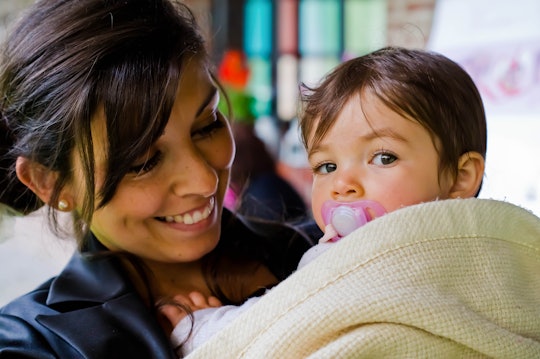Life
There is one thing that every single parent-to-be has done at least once. It might be embarrassing to admit or something you even keep to yourself, but everyone has done it: they've taken bad advice from a parenting book. It's completely understandable that a mother-to-be would want to arm herself with as much knowledge as possible to be prepared for when their child arrives. But there are just some pieces of advice from parenting books you should never follow.
It's bad enough that everyone from your co-workers and acquaintances to family and friends tend to offer their unsolicited parenting tips at every opportunity. But when you have piles of books written by experts, long-time parents, and people with medical degrees, it can be confusing to sift out the good advice from the downright bad. Before you beat yourself up for feeling so lost, take a breather and reminder that every other parent has been in your exact shoes at least one time, if not more. Although you shouldn't be too afraid to ask for help or to seek guidance, you should also be aware of the common advice found in many parenting books that you should never listen to. Check out these bad child-rearing tips and why you should ignore them.
1
Punish Now, Talk Later
Everyone has a bad day where they lash out in a moment of frustration, and that's OK. But some parenting books actually advise you to scold immediately without taking the time to talk to your children. Not the best plan. As psychoanalyst Laurie Hollman, wrote for The Huffington Post, punishing first keeps you from thinking before your act. "Consequences don't teach lessons if what is underlying the behavior isn't first understood."
2
Follow A Strict Feeding Schedule
I read in parenting books and was even told by a nurse, that I would be spoiling my son if I fed him on demand. This didn't sit right with me and it turns out there's a good reason why. "For the first three months, follow the baby's lead and feed on demand," Katherine Karlsrud, an assistant clinical instructor in pediatrics at Weill Medical College of Cornell University, told Parents. "By the time he's 4-months-old, he'll probably have established his own schedule anyways."
3
____ Always Works.
You can literally insert any piece of advice here, and simply by adding the word "always" it can become poor guidance. Just because something worked for one parent doesn't mean that it will or even should work for you. One of the main problems with parenting books is that they are written to a mass audience. While that may be good for business, it's not a good model for parenting. It's helpful to remember that you and your baby have your own unique needs and solutions.
4
Don't Hold Your Baby Too Much
Plenty of parenting books and experts from past generations believe that constantly showing your baby physical attention could not only spoil them, but set them up to be weak individuals. However, in a study published by the University of Notre Dame's Department of Psychology, Professor Darcia F. Narvaez found that it's impossible to "spoil" a baby and holding your child in response to their cries actually helps to calm their developing brain.
5
Keep Your Child Away From Germs
In an age when hand sanitizer is found in practically every classroom, play facility, and baby bag, the anti-germ trend might actually be causing more harm than good. According to a study published in the British Medical Journal, if children aren't exposed to germs in early childhood, it can make them more susceptible to diseases later in life.
6
Never Fight In Front Of Your Children
Obviously it's not a good idea to consistently expose your child to a violent or unstable environment, but many parenting books advise against any kind of arguments occurring in front of your kids. But Andrea Smith, parenting expert and mother of two, told CNN that "it can be valuable for children to see their parents work through a disagreement [and] to learn even people who love each other don't get along perfectly."
7
Use Food As A Reward
Plenty of parenting books (and a certain relative of mine) think that food is a great incentive for young children. While using desert as an occasional treat for something special isn't too bad, if you get in the habit of using forbidden foods (like sweets) as rewards for finishing veggies at dinner, you setting them up for poor health. Dr. T.J. Gold, a New York-based pediatrician, told Yahoo that "by making mealtime a challenge to get over the finish line, you’re instructing them to ignore their satiety cues and developing poor eating habits."
8
Sleep When Your Baby Sleeps
Everyone knows that sleep is a rare commodity in the beginning of parenthood, so it's not surprising that people will look for any opportunity to catch up on some much-needed rest. However, if you force yourself to sleep whenever your child does, you may end up feeling more resentful than rested. You know yourself best; so if your body is telling you that it needs food or quiet or something else besides sleep, then do that. Don't think that you have to sleep when your baby sleeps.
9
Talk To Your Kids
Before you jump to a bad conclusion here, think about it for a second. So many parenting books see "talking to your child" as an easy solution for everything from mending bad behavior to getting them to do chores. Yet, Dr. Joseph Shrand, instructor of psychiatry at Harvard Medical School, told SheKnows, that you should talk with them. "To is unidirectional, which may tune a kid out. With is a dialogue between people."
